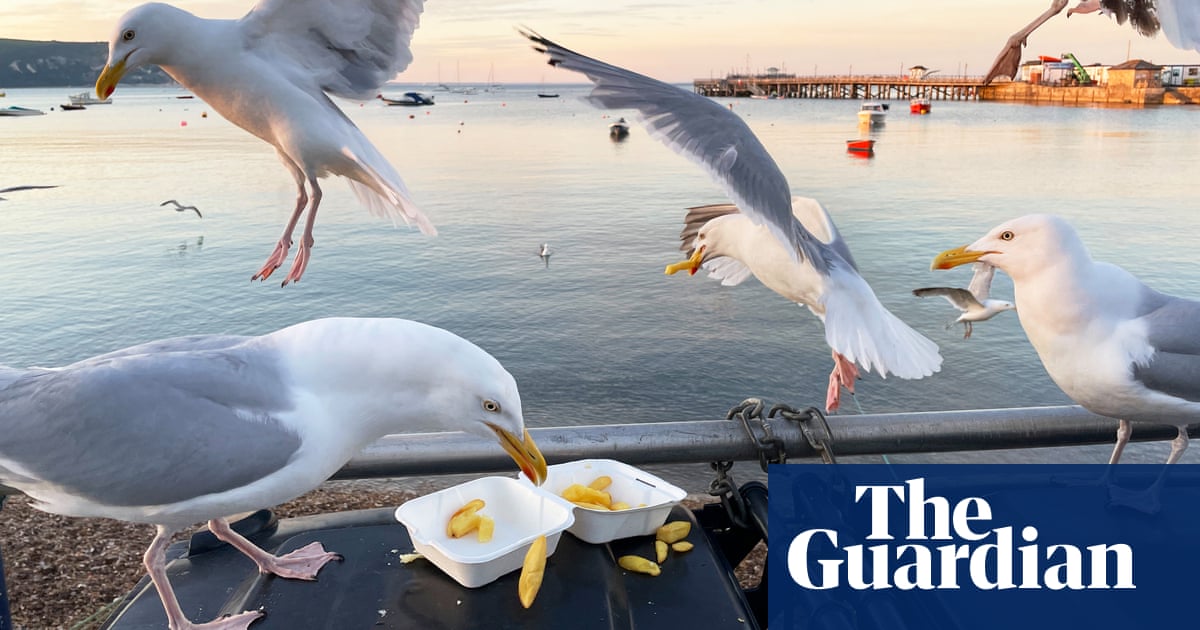Name: XL gullies.
Age: First identified in March.
Appearance: Winged and dangerous.
Not more irresponsible dog breeding ⦠wait, did you say âwingedâ? Thatâs right. XL gullies are âBritainâs HARDEST seagullsâ.
âBritainâs hardest seagullsâ should be a Ross Kemp show. Indeed; there is genuine drama to this story. A new breed of seagull is terrorising the country.
Thereâs no such thing as a seagull. OK, smartypants. Weâre mainly talking about herring gulls. Britons believe they are getting bolder, fiercer and more successful at stealing our snacks. See, for instance, reports of a âjacked-up gargantuanâ, âtop-level bossâ gull operating out of Liverpool city centre.
Yikes. How exactly is it operating? Carrying out laser-focused smash-and-grab attacks on peopleâs snacks (Greggs is reportedly its favourite).
Give me more incidents of gull crime. With pleasure. For a deep-dive report, the Daily Mail sent journalists to Margate in Kent and St Ives in Cornwall to walk around with chips and see what happened.
And what happened? Gulls ate their chips.
Astonishing. Are those towns chip-theft hotspots? No, XL gullies are everywhere. Reddit users have been comparing notes on no-go zones. Aberdeen gulls are âpsychoticâ and âabsolutely ruthlessâ; mid-Wales ones are âpure evilâ; Tenby gulls are âas big as turkeysâ; Rhyl gulls âneed Asbosâ; and Cornish gulls are âpterodactylsâ.
This is like a sinister avian version of the Beach Boysâ California Girls. Especially the âThey knock me out when Iâm down thereâ bit. (Southern gulls are âmore willing to approach peopleâ, according to preliminary results from a recent study by the universities of Glasgow and Plymouth.)
Are gulls actually violent? Not unless theyâre defending their chicks. There are occasionally reports of minor injuries when they swoop to steal food â but itâs definitely chips they want, not blood.
It may not be a balanced diet, but isnât this expected gull behaviour? Absolutely â and itâs our own fault. Gulls are âvery intelligent ⦠opportunistic and extremely adaptableâ, according to the naturalist Dominic Couzens. Since people discard so much food, the gulls have altered their foraging strategies, including by helping themselves. Itâs not crime, but rather âkleptoparasitismâ.
Can anything be done? You can grass up gulls to various councils, or report interactions to researchers via Glasgow and Plymouthâs Gullâs Eye app. Liverpool has recently deployed a Harris hawk to try to deter the top-level boss and his capos. But like all wild birds, herring gulls are protected â their number is declining â so any retaliation against them is illegal. The best thing to do is stay out of their way (especially when eating chips).
Do say: âIncreasing overlap between anthropogenic landscapes and wildlife habitats has given rise to more human-wildlife conflicts.â
Donât say: âI wish they all could be California gulls.â



